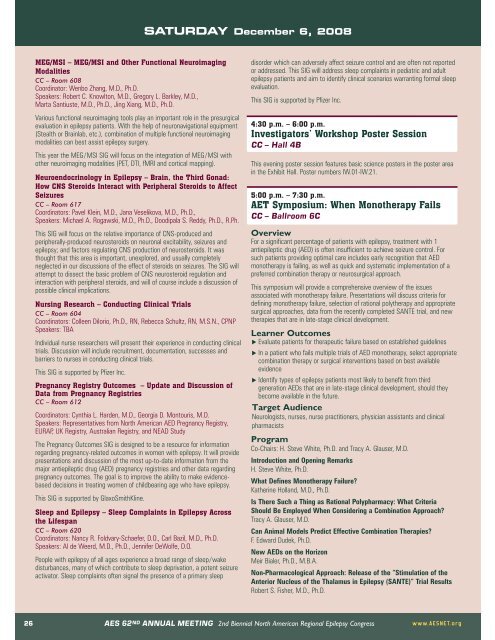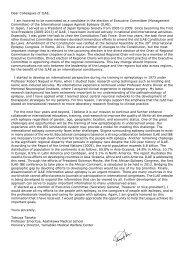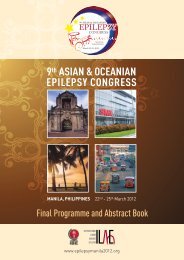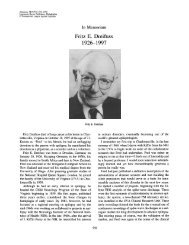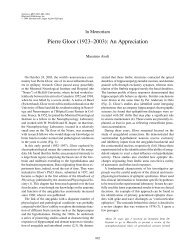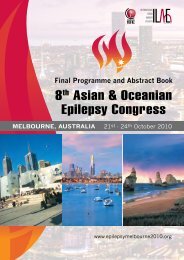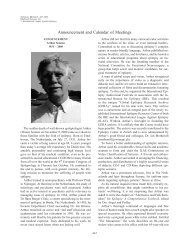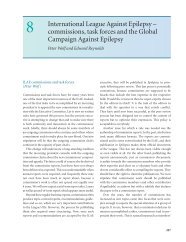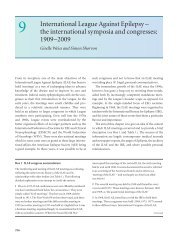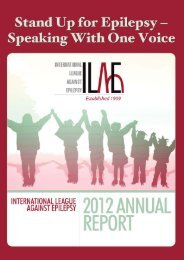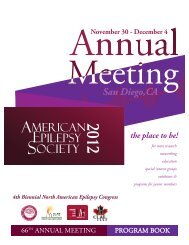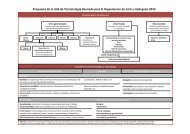Program Book - American Epilepsy Society
Program Book - American Epilepsy Society
Program Book - American Epilepsy Society
- No tags were found...
Create successful ePaper yourself
Turn your PDF publications into a flip-book with our unique Google optimized e-Paper software.
SATURDAY December 6, 2008MEG/MSI – MEG/MSI and Other Functional NeuroimagingModalitiesCC – Room 608Coordinator: Wenbo Zhang, M.D., Ph.D.Speakers: Robert C. Knowlton, M.D., Gregory L. Barkley, M.D.,Marta Santiuste, M.D., Ph.D., Jing Xiang, M.D., Ph.D.Various functional neuroimaging tools play an important role in the presurgicalevaluation in epilepsy patients. With the help of neuronavigational equipment(Stealth or Brainlab, etc.), combination of multiple functional neuroimagingmodalities can best assist epilepsy surgery.This year the MEG/MSI SIG will focus on the integration of MEG/MSI withother neuroimaging modalities (PET, DTI, fMRI and cortical mapping).Neuroendocrinology in <strong>Epilepsy</strong> – Brain, the Third Gonad:How CNS Steroids Interact with Peripheral Steroids to AffectSeizuresCC – Room 617Coordinators: Pavel Klein, M.D., Jana Veselikova, M.D., Ph.D.,Speakers: Michael A. Rogawski, M.D., Ph.D., Doodipala S. Reddy, Ph.D., R.Ph.This SIG will focus on the relative importance of CNS-produced andperipherally-produced neurosteroids on neuronal excitability, seizures andepilepsy; and factors regulating CNS production of neurosteroids. It wasthought that this area is important, unexplored, and usually completelyneglected in our discussions of the effect of steroids on seizures. The SIG willattempt to dissect the basic problem of CNS neurosteroid regulation andinteraction with peripheral steroids, and will of course include a discussion ofpossible clinical implications.Nursing Research – Conducting Clinical TrialsCC – Room 604Coordinators: Colleen DiIorio, Ph.D., RN, Rebecca Schultz, RN, M.S.N., CPNPSpeakers: TBAIndividual nurse researchers will present their experience in conducting clinicaltrials. Discussion will include recruitment, documentation, successes andbarriers to nurses in conducting clinical trials.This SIG is supported by Pfizer Inc.Pregnancy Registry Outcomes – Update and Discussion ofData from Pregnancy RegistriesCC – Room 612Coordinators: Cynthia L. Harden, M.D., Georgia D. Montouris, M.D.Speakers: Representatives from North <strong>American</strong> AED Pregnancy Registry,EURAP, UK Registry, Australian Registry, and NEAD StudyThe Pregnancy Outcomes SIG is designed to be a resource for informationregarding pregnancy-related outcomes in women with epilepsy. It will providepresentations and discussion of the most up-to-date information from themajor antiepileptic drug (AED) pregnancy registries and other data regardingpregnancy outcomes. The goal is to improve the ability to make evidencebaseddecisions in treating women of childbearing age who have epilepsy.This SIG is supported by GlaxoSmithKline.Sleep and <strong>Epilepsy</strong> – Sleep Complaints in <strong>Epilepsy</strong> Acrossthe LifespanCC – Room 620Coordinators: Nancy R. Foldvary-Schaefer, D.O., Carl Bazil, M.D., Ph.D.Speakers: Al de Weerd, M.D., Ph.D., Jennifer DeWolfe, D.O.People with epilepsy of all ages experience a broad range of sleep/wakedisturbances, many of which contribute to sleep deprivation, a potent seizureactivator. Sleep complaints often signal the presence of a primary sleepdisorder which can adversely affect seizure control and are often not reportedor addressed. This SIG will address sleep complaints in pediatric and adultepilepsy patients and aim to identify clinical scenarios warranting formal sleepevaluation.This SIG is supported by Pfizer Inc.4:30 p.m. – 6:00 p.m.Investigators’ Workshop Poster SessionCC – Hall 4BThis evening poster session features basic science posters in the poster areain the Exhibit Hall. Poster numbers IW.01-IW.21.5:00 p.m. – 7:30 p.m.AET Symposium: When Monotherapy FailsCC – Ballroom 6COverviewFor a significant percentage of patients with epilepsy, treatment with 1antiepileptic drug (AED) is often insufficient to achieve seizure control. Forsuch patients providing optimal care includes early recognition that AEDmonotherapy is failing, as well as quick and systematic implementation of apreferred combination therapy or neurosurgical approach.This symposium will provide a comprehensive overview of the issuesassociated with monotherapy failure. Presentations will discuss criteria fordefining monotherapy failure, selection of rational polytherapy and appropriatesurgical approaches, data from the recently completed SANTE trial, and newtherapies that are in late-stage clinical development.Learner Outcomesu Evaluate patients for therapeutic failure based on established guidelinesu In a patient who fails multiple trials of AED monotherapy, select appropriatecombination therapy or surgical interventions based on best availableevidenceu Identify types of epilepsy patients most likely to benefit from thirdgeneration AEDs that are in late-stage clinical development, should theybecome available in the future.Target AudienceNeurologists, nurses, nurse practitioners, physician assistants and clinicalpharmacists<strong>Program</strong>Co-Chairs: H. Steve White, Ph.D. and Tracy A. Glauser, M.D.Introduction and Opening RemarksH. Steve White, Ph.D.What Defines Monotherapy Failure?Katherine Holland, M.D., Ph.D.Is There Such a Thing as Rational Polypharmacy: What CriteriaShould Be Employed When Considering a Combination Approach?Tracy A. Glauser, M.D.Can Animal Models Predict Effective Combination Therapies?F. Edward Dudek, Ph.D.New AEDs on the HorizonMeir Bialer, Ph.D., M.B.A.Non-Pharmacological Approach: Release of the “Stimulation of theAnterior Nucleus of the Thalamus in <strong>Epilepsy</strong> (SANTE)” Trial ResultsRobert S. Fisher, M.D., Ph.D.26AES 62 ND ANNUAL MEETING 2nd Biennial North <strong>American</strong> Regional <strong>Epilepsy</strong> Congresswww.AESNET.org


